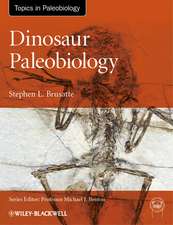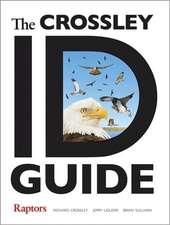Fatigue: Neural and Muscular Mechanisms: Advances in Experimental Medicine and Biology, cartea 384
Autor Patricia A. Pierce Editat de Roger M. Enoka, Simon C. Gandevia, Alan J. McComas, Douglas G. Stuart, Christine K. Thomasen Limba Engleză Paperback – 29 mai 2013
| Toate formatele și edițiile | Preț | Express |
|---|---|---|
| Paperback (1) | 1392.46 lei 6-8 săpt. | |
| Springer Us – 29 mai 2013 | 1392.46 lei 6-8 săpt. | |
| Hardback (1) | 1243.60 lei 6-8 săpt. | |
| Springer Us – 30 noi 1995 | 1243.60 lei 6-8 săpt. |
Din seria Advances in Experimental Medicine and Biology
- 9%
 Preț: 719.56 lei
Preț: 719.56 lei - 5%
 Preț: 717.00 lei
Preț: 717.00 lei - 5%
 Preț: 717.00 lei
Preț: 717.00 lei - 15%
 Preț: 640.24 lei
Preț: 640.24 lei - 5%
 Preț: 715.71 lei
Preț: 715.71 lei - 5%
 Preț: 716.28 lei
Preț: 716.28 lei - 20%
 Preț: 691.93 lei
Preț: 691.93 lei - 5%
 Preț: 1031.00 lei
Preț: 1031.00 lei - 5%
 Preț: 820.42 lei
Preț: 820.42 lei - 5%
 Preț: 716.28 lei
Preț: 716.28 lei - 15%
 Preț: 641.38 lei
Preț: 641.38 lei - 5%
 Preț: 717.20 lei
Preț: 717.20 lei - 5%
 Preț: 715.35 lei
Preț: 715.35 lei - 5%
 Preț: 1113.83 lei
Preț: 1113.83 lei - 20%
 Preț: 1161.71 lei
Preț: 1161.71 lei - 5%
 Preț: 1170.51 lei
Preț: 1170.51 lei - 18%
 Preț: 1119.87 lei
Preț: 1119.87 lei - 5%
 Preț: 1288.48 lei
Preț: 1288.48 lei - 5%
 Preț: 1164.67 lei
Preț: 1164.67 lei - 5%
 Preț: 1101.73 lei
Preț: 1101.73 lei - 18%
 Preț: 1123.67 lei
Preț: 1123.67 lei - 5%
 Preț: 1435.64 lei
Preț: 1435.64 lei - 20%
 Preț: 1044.10 lei
Preț: 1044.10 lei - 18%
 Preț: 946.39 lei
Preț: 946.39 lei - 5%
 Preț: 292.57 lei
Preț: 292.57 lei - 18%
 Preț: 957.62 lei
Preț: 957.62 lei - 18%
 Preț: 1235.76 lei
Preț: 1235.76 lei - 5%
 Preț: 1231.55 lei
Preț: 1231.55 lei - 5%
 Preț: 1292.30 lei
Preț: 1292.30 lei - 5%
 Preț: 1102.10 lei
Preț: 1102.10 lei - 18%
 Preț: 1132.81 lei
Preț: 1132.81 lei - 5%
 Preț: 1165.19 lei
Preț: 1165.19 lei - 5%
 Preț: 1418.48 lei
Preț: 1418.48 lei - 5%
 Preț: 1305.63 lei
Preț: 1305.63 lei - 18%
 Preț: 1417.72 lei
Preț: 1417.72 lei - 18%
 Preț: 1412.99 lei
Preț: 1412.99 lei - 24%
 Preț: 806.15 lei
Preț: 806.15 lei - 18%
 Preț: 1243.29 lei
Preț: 1243.29 lei - 5%
 Preț: 1429.44 lei
Preț: 1429.44 lei - 5%
 Preț: 1618.70 lei
Preț: 1618.70 lei - 5%
 Preț: 1305.12 lei
Preț: 1305.12 lei - 18%
 Preț: 1124.92 lei
Preț: 1124.92 lei - 5%
 Preț: 1097.54 lei
Preț: 1097.54 lei - 15%
 Preț: 649.87 lei
Preț: 649.87 lei - 5%
 Preț: 1097.54 lei
Preț: 1097.54 lei - 18%
 Preț: 945.79 lei
Preț: 945.79 lei - 5%
 Preț: 1123.13 lei
Preț: 1123.13 lei - 20%
 Preț: 816.43 lei
Preț: 816.43 lei
Preț: 1392.46 lei
Preț vechi: 1698.12 lei
-18% Nou
Puncte Express: 2089
Preț estimativ în valută:
266.45€ • 278.76$ • 221.34£
266.45€ • 278.76$ • 221.34£
Carte tipărită la comandă
Livrare economică 02-16 aprilie
Preluare comenzi: 021 569.72.76
Specificații
ISBN-13: 9781489910189
ISBN-10: 1489910182
Pagini: 556
Ilustrații: XIV, 542 p.
Dimensiuni: 155 x 235 x 29 mm
Greutate: 0.77 kg
Ediția:Softcover reprint of the original 1st ed. 1995
Editura: Springer Us
Colecția Springer
Seria Advances in Experimental Medicine and Biology
Locul publicării:New York, NY, United States
ISBN-10: 1489910182
Pagini: 556
Ilustrații: XIV, 542 p.
Dimensiuni: 155 x 235 x 29 mm
Greutate: 0.77 kg
Ediția:Softcover reprint of the original 1st ed. 1995
Editura: Springer Us
Colecția Springer
Seria Advances in Experimental Medicine and Biology
Locul publicării:New York, NY, United States
Public țintă
ResearchCuprins
Looking Back.- The Scientific Contributions of Brenda Bigland-Ritchie.- Section I: Fatigue of Single Muscle Fibers.- 1. Myofibrillar Fatigue versus Failure of Activation.- 2. Mechanisms of Excitation-Contraction Coupling Relevant to Skeletal Muscle Fatigue.- 3. The Role of Intracellular Acidosis in Muscle Fatigue.- 4. Role of Interstitial Potassium.- Section II: Fatigue at the Neuromuscular Junction.- 5. Fatigue at the Neuromuscular Junction: Branch Point vs. Presynaptic vs. Postsynaptic Mechanisms.- 6. The Role of the Sarcolemma Action Potential in Fatigue.- 7. Single Fiber Electromyography in Studies of Neuromuscular Function.- Section III: Fatigue of Single Motor Units.- 8. Intrinsic Properties of Motoneurons: Implications for Muscle Fatigue.- 9. Neuromuscular Frequency Coding and Fatigue.- 10. Human Motor Units Studied by Spike-Triggered Averaging and Intraneural Motor Axon Stimulation.- 11. Human Motor Units Studied by Intramuscular Microstimulation.- Section IV: Fatigue Studied with NMR Techniques.- 12. Bioenergetics and Muscle Cell Types.- 13. Metabolic Correlates of Fatigue from Different Types of Exercise in Man.- 14. Mechanisms of Human Muscle Fatigue: Quantitating the Contribution of Metabolic Factors and Activation Impairment.- 15. Emerging Opportunities with NMR.- Section V: The Case for Segmental Motor Mechanisms.- 16. Variable-Frequency Stimulation Patterns for the Optimization of Force during Muscle Fatigue: Muscle Wisdom and the Catch-like Property.- 17. Overview: Potential Role of Segmental Motor Circuitry in Muscle Fatigue.- 18. The Fusimotor System: Its Role in Fatigue.- 19. Role of Muscle Afferents in the Inhibition of Motoneurons during Fatigue.- Section VI: The Case for Central Fatigue.- 20. Central Fatigue: Critical Issues, Quantification and Practical Implications.- 21. Single-Trial Readiness Potentials and Fatigue.- 22. The Senses of Effort and Force during Fatiguing Contractions.- 23. Tryptophan, 5-Hydroxytryptamine and a Possible Explanation for Central Fatigue.- Section VII: Task Dependency of Fatigue Mechanisms.- 24. The Significance of Motor Unit Variability in Sustaining Mechanical Output of Muscle.- 25. Intramuscular Pressures for Monitoring Different Tasks and Muscle Conditions.- 26. Task-Dependent Nature of Fatigue in Single Motor Units.- 27. Task-Dependent Factors in Fatigue of Human Voluntary Contractions.- Section VIII: Integrative Systems Issues.- 28. Fatigue and the Design of the Respiratory System.- 29. An Integrative View of Limitations to Muscular Performance.- 30. Respiratory Muscle Fatigue.- 31. Fatigue of Jaw Muscles and Speech Mechanisms.- Section IX: Fatigue of Adapted Systems: Overuse, Underuse, and Pathophysiology.- 32. Fatigue in Adapted Systems: Overuse and Underuse Paradigms.- 33. Associations between Muscle Soreness, Damage, and Fatigue.- 34. Muscle Fatigue in Old Animals: Unique Aspects of Fatigue in Elderly Humans.- 35. Historical Perspective: A Framework for Interpreting Pathobiological Ideas on Human Muscle Fatigue.- 36. Fatigue Brought on by Malfunction of the Central and Peripheral Nervous Systems.- Epilogue.- 37. Neurobiology of Muscle Fatigue: Advances and Issues.- Contributors.










